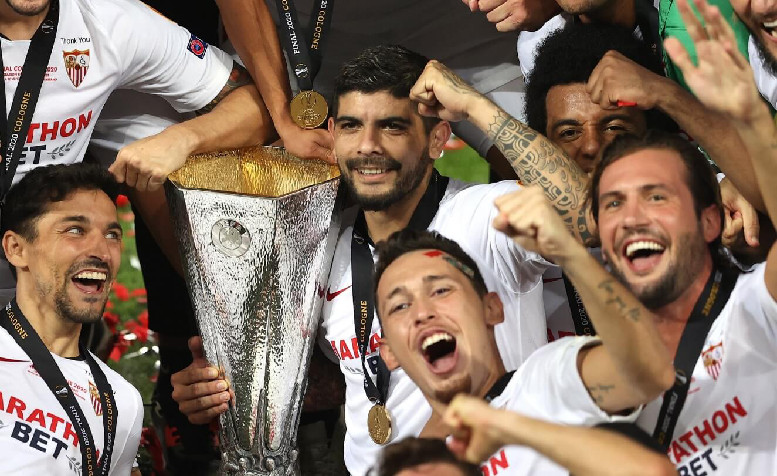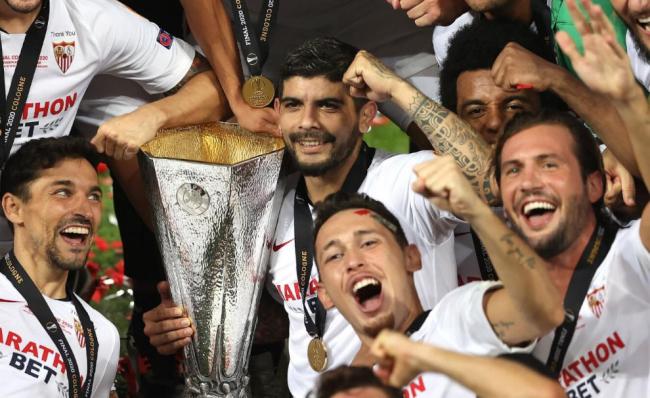This past weekend the two national spanish football competitions began: La Liga Santander and Liga Smartbank. By far, these are the sports contests that with 9 months of duration have become the main visibility platform for a large number of online gambling operators. We believe that it is the perfect time to update our readers on the striking clash between clubs and operators and Minister Alberto Garzón.
It is hard to believe that once the First and Second Division leagues have started, the current sponsorship of Online Gaming Operators continues to be as intense as it was demonstrated last week with the recent agreement between Grupo Orenes (VS) and Atlético de Madrid.
As we can see in these first days in both competitions, the bookmakers will continue to be more than visible in kits, stadiums and on the many platforms that professional football clubs make available to their sponsors. If in 2019 the advertising investment of the operators reached almost 300 million euros, with sports sponsorship taking a large part of this budget in operators such as
Betway,
Betfair,
Luckia,
Codere,
Bwin or
MarathonBet; surprisingly, the season that should be marked by the disappearance of this form of marketing, the agreements between operators and clubs are either maintained or increased.
How is it possible that at the gates of a new regulation on Advertising - which explicitly prohibits the visibility of operators through sports sponsorships - we continue to see such a strong development in this area?
In the next few lines we will try to answer this question. And we will do so by addressing the following issues:
1- Chronology on the control of Advertising in the Game
2- A radical change in the Regulations: from the Draft to the final version
3- The initial response of the sector: deaf ears (renewals and new agreements)
4- Garzón's first warning
5- More sponsorships
6. Garzón's second warning
Timeline on the control of In-Game Advertising
Although perhaps in 2012 the reality was not like that, in these more than 8 years of regulated market in Spain they have served to verify that Advertising is the key area and the essence of a legal gaming environment where the Public and Private sectors, and the On-site and Online channels can be measured on equal terms.
Articles 7 and 8 of Law 13/2011 on Gaming Regulation served as the genesis of a legislative text for the control of advertising. However, the years passed and it was not developed ... With the emergence of Responsible Gaming as a basic need of the sector, in 2015 a process began that in the form of a first draft Royal Decree was going to make the State the regulator of advertising. Until then it was an activity carried out by the same operators under the prism of self-regulation.
In 2020, PSOE and Podemos, after a campaign in which the issue was hot, confirm that the control of commercial communications was already in a countdown process and that in their action plan in the Government, this is addressed from the idea of ??imposing significant restrictions on advertising, similar to those for tobacco and alcohol.
In a schematic way, we can highlight the following dates as a chronology of the issue:
- February 24, 2020: the Draft of the Royal Advertising Decree is published and the public consultation period begins.
- March 16, 2020: the public consultation period of the Draft ends.
- April 3, 2020: special measures on the promotional activity of operators due to the State of Alarm (Covid-19) come into force
- June 10, 2020: the measures taken during the State of Alarm are lifted.
- July 9, 2020: A new draft is sent to the European Commission for approval.
- July 21, 2020: the European Commission approves the Draft.
After these steps, the situation is clear and at the end of August it is confirmed that the month of October will be the date on which the Council of Ministers approves the desired decree, although it is already certain that almost nobody will like it, not even to those who for years asked for its implementation.
A radical change in the Regulations: from the Draft to the final version
If we can highlight something from the chronological journey that we have analyzed in the previous section, it is how the Minister of Consumption, Alberto Garzón, has managed to bring about a rather drastic change. If when in February, he had to face criticism for being lukewarm, now and after having received the endorsement of the European Commission, his position of strength is clear and everything suggests that the Decree that will be approved by the Council of Ministers in October will be much tougher than the February Draft. A reality that has counted on the urgent measures imposed on advertising during the State of Alarm, a real test bed and that will resemble the reality that lies ahead for operators ... including sports sponsorships, which disappeared during those almost three months.
Although it should be noted that this change and what we are seeing in Spain is not new, perhaps having a more energetic tone due to the new political color of the Ministry ... but it is understood within a domino effect that spreads throughout Europe and that It has the Dignità Decree of Italy with the most paradigmatic example.
The initial response from the sector
Not even after the government's unexpected reaction to anti-covid measures, operators have reversed what is usually their usual schedule of negotiations with sports clubs, even knowing that eliminating this form of marketing was the new priority of the new approved text. at the European Commission.
Thus, of the 19 LaLiga Santander clubs with the main sponsor present on their shirts, seven have it with bookmakers. Alavés, Levante and Betis will wear Betway; Sevilla will wear Marathonbet; Valencia will wear Bwin on the front of their shirt; Granada will do the same with Winamax and Cádiz with Dafbet.
In basketball, fear has had its effect almost immediately and since spring, the two clubs that, in addition to visibility, had a presence in the club's "naming": Retabet (Bilbao Basket) and Kirolbet (Baskonia) have already announced that they would adjust to the reality marked by the first draft of the Decree.
So, since July, the proliferation of these sponsorship agreements shows the confrontation at the legal level between professional sports, championed by the League, and the clubs, operators and the Ministry itself.
Garzón's first warning
With football almost underway, on August 27, Minister Garzón gave a first warning to the clubs that are signing sponsorship agreements with gaming operators. In several interviews and with the content of this Tweet that we reproduce below, the Government sends a first message as a warning:
The Minister of Consumption, Alberto Garzón, thus confirms that the idea that the Commercial Communications Decree can be made public and enter into force in October is still being carried out, while also targeting the clubs, noting that in his opinion they are taking too many risks when renewing or signing sponsorship agreements with bookmakers.
Moved by literal expressions of the Minister (who comes to define this policy of the clubs as "an error that they will have to correct"), the media opted for withering headlines like: "Garzón thunders online football betting advertising" and they accompany any mention of the subject, qualifying it as "the problem of advertising."
More sponsorships
But Garzón's response, accompanied by current events such as Sevilla CF's triumph in the Europa League - making the MarathonBet logo have global reach, eluding any reality of the debate on restricting advertising in regulated markets - did not achieve the objective. expected and up to eight new endorsement deals were announced following the Minister's tweet.

Sevilla CF players celebrating their last European title (Europa League 2020)
Garzón's second warning
And already last week, a national operator (VERSUS / VS) had to reach an agreement with which is the third team in budget and social mass in Spain -Atletico de Madrid-, to see a new response from Garzón, that amplifies the message given, with the same straight tone but adding a new element to the equation: creating a grace period to extinguish those sponsorship agreements already signed between operators and clubs.
A formula that refers us to what happened in Italy with the Dignità Decree and that sheds some light on the clubs that have recently made the decision to sign their sponsorships.
From what we have been able to inquire from Infoplay, on this issue there were two currents among the operators:
i) conservatives who were not going to risk or seek trouble by resorting to such an expensive and difficult-to-activate form of advertising at such a high cost at the exposure level.
ii) and others who considered that it was a good time to sign agreements since, based on the principle of legal certainty, their legal departments trusted that the Advertising Decree would not have scope to undo the signed contracts, under penalty of possible legal actions by part of clubs and the LFP or substantial compensation.
Among the operators in the second case, the existence of a grace period as occurred in Italy was also considered almost guaranteed, which would give a margin of maneuver to amortize the agreements and seek an adequate resolution.
In any case, Garzón has already named that grace period: it will be a "period of adaptation" and has also limited its scope in time: "it will be short and not of years as some wish." Thus, a priori, nothing changes: the Ministry of Consumption considers that it is "reckless that the clubs are renewing sponsorships."
So, after this intense tug of war, what seems clear is that the calm element that characterized the first draft of February and that was interpreted as an attempt to "save the football industry", now no longer exists and the promise made by PSOE and United We can that the sector would have a regulation "similar to that of tobacco products" is about to become reality.
As the second part of this SPECIAL ON SPONSORSHIPS and the CONTENT BETWEEN THE GOVERNMENT AND CLUBS, tomorrow we will try to discover what kind of sports sponsorships are those that come and attending to the existing examples in regulated markets such as Italy or different situations such as the visibility of houses of Asian bets and other cases of visibility of operators without a license, how this new Decree shows the inability of Regulators to solve the problem of advertising the Game in sport.
18+ | Juegoseguro.es – Jugarbien.es




